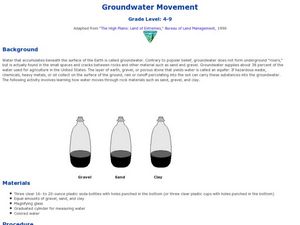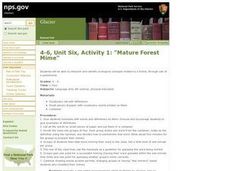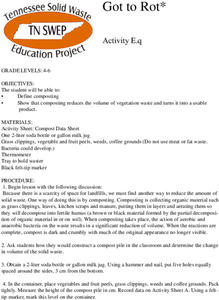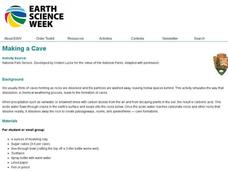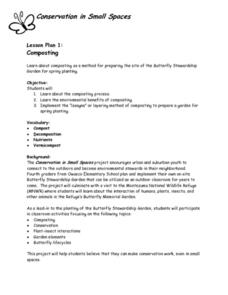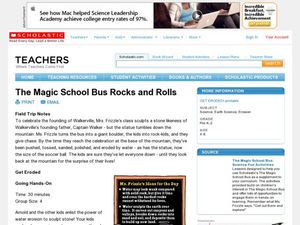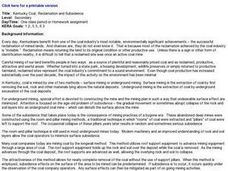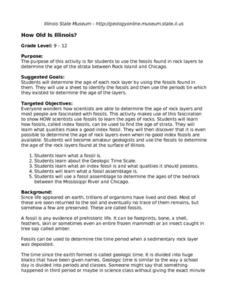Curated OER
Forest Floor Terrarium
Students study the aspects of a forest floor ecosystem, including decomposition, the water cycle, food webs, the needs of living things, and physical vs. chemical change over an extended period. In addition, students conduct observations...
Curated OER
Genes and Aging
Students explore genes and the way we age. They assemble a worm collection device called a Baermann Funnel. Students collect Caenorhabditis elegans or other active nematodes from local soil samples. They observe the appearance and...
Curated OER
Interpreting An Archaelogical Site
Students study the site of an archaeological dig site in order to begin looking at how they can be interpreted. They look at a soil profile and respond to a research question that simulates a real site. The other questions are used to...
Curated OER
Recycled Water?
Young scholars participate in a hands-on activity to investigate how water is recycled in a small environment, and determine how water is cycled on earth.
Curated OER
Antarctica Vocabulary Quiz
In this Antarctica vocabulary worksheet, students match vocabulary words about Antarctica with definitions, 15 words total. Worksheet contains a link to additional activities. Labeled as a quiz, but may be used for practice or review.
Curated OER
Making a Human Tree
Students explore botany by defining the anatomy of a tree. In this environmental exploration lesson, students research plant vocabulary terms and discuss the uses of each word. Students create a "human" tree by role-playing as one of the...
Curated OER
Spud Smear
Young scholars study various samples of microorganisms in petri dishes. In this microorganism lesson, students place various samples of items in petri dishes and observe them after several days of incubation.
Curated OER
Groundwater Movement
Students study groundwater movement beneath the surface of the Earth. In this agriculture lesson, students experiment with how water moves through rock materials such as sand, gravel, and clay.
Curated OER
Mature Forest Mime
Students come to understand vocabulary words through pantomime. For this vocabulary lesson, students first review several vocabulary words and their meaning, then they work in groups to pantomime the definitions.
Curated OER
Air Quality and Transportation
Second graders study about air pollution and the effects it has on our Earth. Students tally cars on a sheet that has been categorized as follows: One person in car, two persons in car, or three or more persons in car. Students go to...
Curated OER
Got to Rot
Students make their own compost in a 2-liter jug and determine the actual volume loss in the composted material over a six-month period.
Curated OER
Making a Cave
Students discuss caves. In this science lesson, students experiment with how dissolution, a chemical weathering process, leads to the formation of caves. Once the cave is finsihed students draw a picture or describe in writing what it...
Curated OER
Changing Planet: Permafrost Gas Leak
Pair earth scientists up to use an amazing online arctic portal mapping tool and Google Earth to analyze permafrost changes. They compare changes to data on atmospheric concentrations of methane to see if there is a correlation. Then...
Curated OER
Conservation in Small Places - Composting
A fabulous lesson introduces the art of composting to your gardeners. In it, youngsters learn about the composting process and how it actually works. They discuss the environmental benefits of composting, and use the "lasagna" method...
Curated OER
Transport in Plants
Quite a detailed and advanced look at the transport mechanisms of a plant. The absorption and control of sugar and water concentration are explained and will help an understanding of homeostasis concepts and organ specialization.
Curated OER
The Magic School Bus Rocks and Rolls
Students participate in a science experiment to show them the power that water erosion has to sculpt stone. They explore how running water moves earth and creates new landforms.
Curated OER
Kentucky Coal, Reclamation and Subsidence
Young scholars read and discuss the information that they read on the "Kentucky Coal, Reclamation and Subsidence." They then answer questions in reference to the reading. Some questions that students answer are: What is reclamation?,...
Curated OER
The Water Cycle
Students develop a better understanding of the need to conserve our renewable resources. In this water cycle lesson students take notes, complete a guide sheet and illustrate the water cycle.
Curated OER
How Old Is Illinois?
Students use fossils found in rocks to determine the age of rock in Illinois. They use a chart to identify the fossils and then identify the periods of rock.
Curated OER
The good microbes
The question posed for the class to consider; What would decay and what would not? They read the short passage on decomposition and microbes, then mark the items that would decay after a two-week period. A scientific investigation idea...
Curated OER
A Home for a Cricket
First graders build a habitat for crickets after studying animal survival needs. They care for and observe the crickets in the classroom habitat.
Curated OER
Who Lives with Mallard?
Learners color a picture of the habitat featuring mallard and other creatures, some of whom might be camouflaged or half-hidden. They discuss other forms of animal adaptation.
Curated OER
Talkin' Trash (All About Landfills)
Students investigate the types of waste created by people and identify various options for trash disposal. They read and discuss a handout about what a landfill is and the different types of trash, match types of trash with the proper...
Curated OER
Rock Cycles, Crayon Cycles
Students examine the rock cycle and the path that rocks go through to rearranged in different ways. They define key vocabulary terms, then in small groups conduct a variety of experiments using crayon shavings as simulated rocks and...







